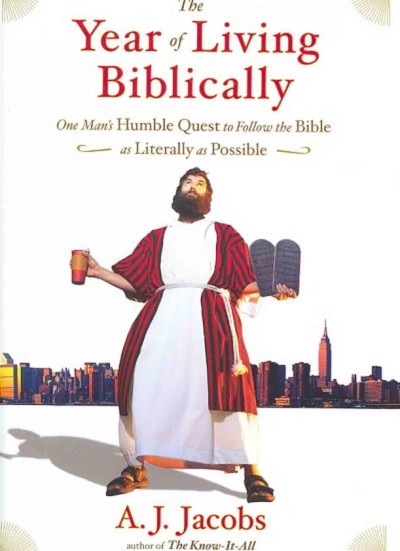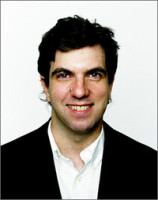
The Year of Living Biblically: One Man's Humble Quest to Follow the Bible as Literally as Possible
by A.J. Jacobs
Published: October 1, 2007
Genres: Memoir, Non-fiction
Format: eBook (388 pages)
Source: Purchased
moreFrom the bestselling author of "The Know-It-All" comes a fascinating and timely exploration of religion and the Bible. Raised in a secular family but increasingly interested in the relevance of faith in our modern world, A.J. Jacobs decides to dive in headfirst and attempt to obey the Bible as...
Short and Sweet Version
I read this book on a recommendation from a friend. When I first saw it, it seemed like it was mocking religion. The cover kind of says “See how ridiculous religion is? LOL.” While there is humor, it’s more self-deprecating instead of mocking. That being said, the humor wasn’t that hilarious. It was more like amusing. I was entertained by his writing and I surprisingly learned a few things. It was a fast, entertaining read but the humor didn’t quite blow me away.
Jessica Thinks Too Much Version
I thought The Year of Living Biblically would be more about living primitively. I kind of expected him to make bricks out of straw or something. The author, A. J., was more focused on trying religion out in a bizarre way. I was surprised that he actually got quite a bit out of his experiment. He grew spiritually. At the end, he’s not ready to join Judaism or anything but I really felt that he was changed and would think about morals a lot differently after this. His motivation behind this experiment was his son and how to teach him morals.
I don’t want him to swim in this muddy soup of moral relativism. I don’t trust it. I have such a worldview, and though I have yet to commit a major felony, it seems dangerous. Especially nowadays.
– A. J. Jacobs, The Year of Living Biblically: One Man’s Humble Quest to Follow the Bible as Literally as Possible (p. 39).
Seeing him adapt ancient commandments to a modern world was fun. My favorite interpretation was for the commandment of gleaning which he described like this:
The idea of gleanings is one of my favorites in the Bible. It goes like this: When you harvest your field, don’t reap the entire field. Leave the corners unharvested so that the leftovers— the gleanings— can be gathered by the poor. It’s a beautiful and compassionate rule. Plus, the commandment rewards people for doing a half-assed job, which I think is a nice notion.
– A. J. Jacobs, The Year of Living Biblically: One Man’s Humble Quest to Follow the Bible as Literally as Possible (p. 166).
If only we could be rewarded for doing everything half-assed. A. J. decided to leave money at the ATM to follow this commandment. He was concerned that the person getting the money was most likely rich and not poor, but it was the best idea he had since he didn’t actually farm.
I learned a lot about the Jewish faith from reading this. A. J. actually explored a lot of religions during this experiment which I wasn’t expecting. He had a lot of questions about how to interpret and live certain commandments so he interviewed leaders from a variety of religions. I was familiar with Jewish kosher laws, but I had no idea where the tradition of them came from. It’s such a neat story.
But the rabbis have a far more elaborate interpretation: Exodus 23: 19 actually means to separate milk and meat. Which is where you get the kosher rules banning cheeseburgers. Along with the myriad rules about how long you must wait between a meat course and a dairy course (from one hour to six hours, depending on local tradition) and whether you should separate dairy utensils and meat utensils in a dishwasher (yes). Strict Orthodox Jews believe that God gave these amplifications— the “oral laws” —to Moses on the mountaintop. That’s why he was up there for forty days . Moses passed on the oral laws to the Israelites, who told them to their sons, and so on until they were eventually written down.
– A. J. Jacobs, The Year of Living Biblically: One Man’s Humble Quest to Follow the Bible as Literally as Possible (p. 69).
A. J.’s self-deprecating humor was great. It wasn’t in there a ton, but when it was it made me smile.
I’m no handyman. Put it this way: When I watch Bob the Builder with Jasper, I always learn something new (oh, so that’s what a strut is).
– A. J. Jacobs, The Year of Living Biblically: One Man’s Humble Quest to Follow the Bible as Literally as Possible (p. 78).
I also thought this quote was hilarious. We all have an eccentric aunt Marti, right?
My aunt Marti , the vegan and animal rights activist, found out about my honey eating and sent me a rebuking email. The subject header was “The bitter truth about honey.” She listed all the ways the commercial honey industry mistreats bees. I won’t reprint it here, but her description of artificial bee insemination was disturbingly graphic. She signed the note, “Your eccentric aunt Marti.”
– A. J. Jacobs, The Year of Living Biblically: One Man’s Humble Quest to Follow the Bible as Literally as Possible (p. 173).
I’m a religious person. I’ve read the Bible. So I was pleasantly surprised at some of the insights he found in the Bible that I had never thought about. A. J. was struggling with infertility. He talked about how the stories of infertility stood out to him and gave him comfort.
There is an upside to the Bible’s infertility motif: The harder it was for a woman to get pregnant, the greater was the resulting child. Joseph. Isaac. Samuel.
– A. J. Jacobs, The Year of Living Biblically: One Man’s Humble Quest to Follow the Bible as Literally as Possible (pp. 19-20).
I liked his insight on how religion was a surprising paradox. Having to make less choices because of all the commandments he was living was actually freeing to him and not confining like he thought it would be. He didn’t gossip and so negative thoughts just stopped occurring to him in the first place. Religion was also surprisingly grounding to him. It made him look at life realistically and honestly.
This book inspired me to be more grateful in my life. I loved these two quotes about gratitude. They are so true.
The prayers are helpful. They remind me that the food didn’t spontaneously generate in my fridge. They make me feel more connected, more grateful, more grounded, more aware of my place in this complicated hummus cycle.
– A. J. Jacobs, The Year of Living Biblically: One Man’s Humble Quest to Follow the Bible as Literally as Possible (pp. 95-96).
I’ve never before been so aware of the thousands of little good things, the thousands of things that go right every day.
– A. J. Jacobs, The Year of Living Biblically: One Man’s Humble Quest to Follow the Bible as Literally as Possible (p. 269).
So maybe it wasn’t a mind blowing, hilarious, laugh-until-my-sides-ache book. But I’m still glad I read it. It’s a nice reminder of the importance of religion and gratitude in my life and I enjoyed seeing someone going through the process of learning that, too.
If you could do anything for one year, what would it be?
This is the second novel I’ve read about doing something for a whole year. The other book was Tolstoy and the Purple Chair. I really love the idea of reading a book a day for a year like in Tolstoy and the Purple Chair. A. J. Jacobs has written other books about year-long experiments including reading the entire Encyclopaedia Britannica, and becoming perfectly fit. What one would you do?
Content Rating: Mild. Very mild language.
This post contains affiliate links and I receive a small percentage of sales made through these links.
Reading this book contributed to these challenges:









 My name is Jessica. I love to read Young Adult and classic literature. I’ve been a book blogger for six years and I haven’t gotten tired of it yet. I’m a very curious reader. Writing about all the questions and thoughts I had while reading a book is the best hobby ever.
My name is Jessica. I love to read Young Adult and classic literature. I’ve been a book blogger for six years and I haven’t gotten tired of it yet. I’m a very curious reader. Writing about all the questions and thoughts I had while reading a book is the best hobby ever.
I’ve been wondering if I should read this one. I like that it’s about religion more than making bricks from straw. ;) I totally thought that’s what he did too. Loved the quotes.
I heard A.J. Jacobs speak recently and I thought he had some fascinating ideas. He talked a little about his experiment with living Biblically, which made me want to read the book. Sounds like it’s worth the read, even if the book isn’t exactly mind-blowing.